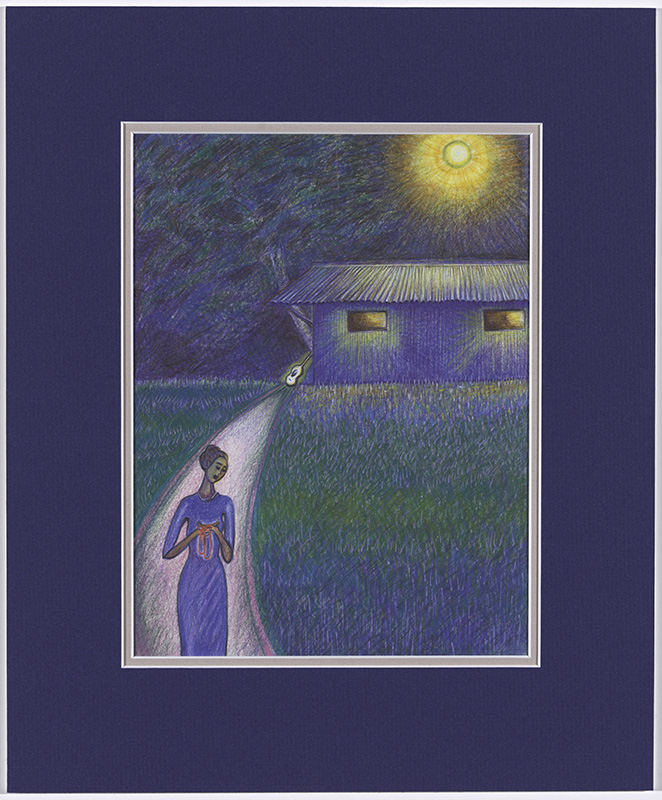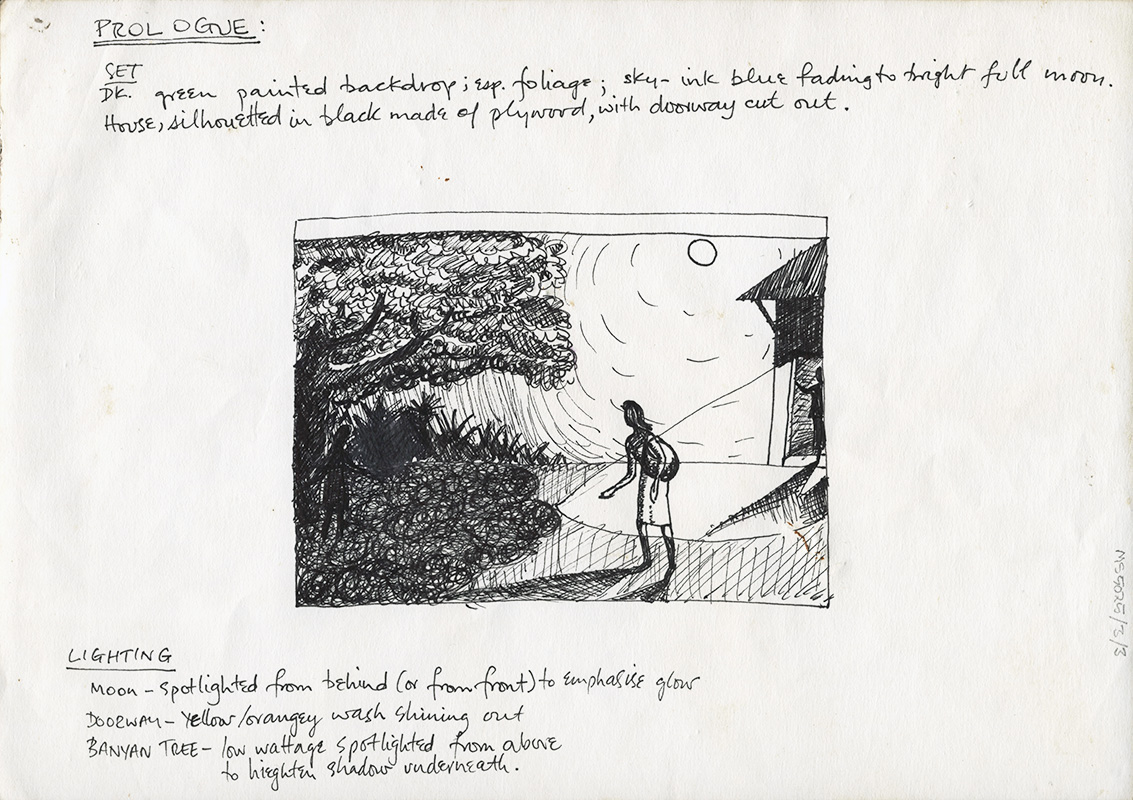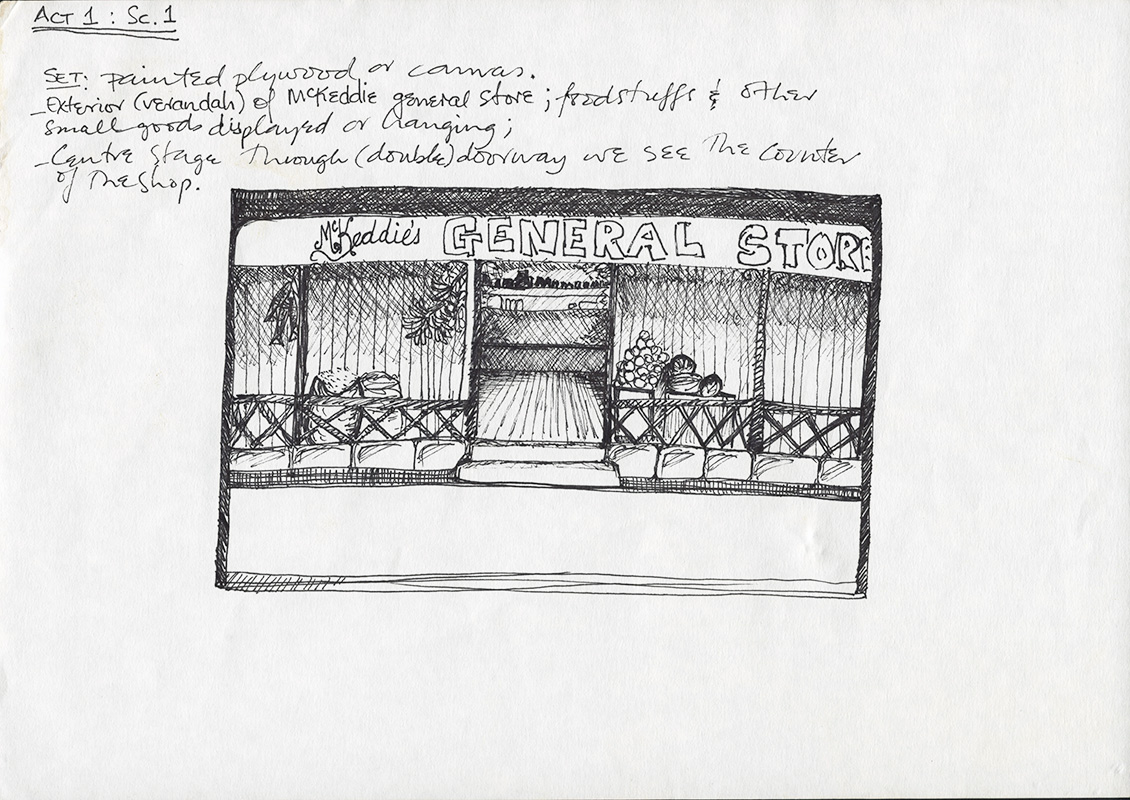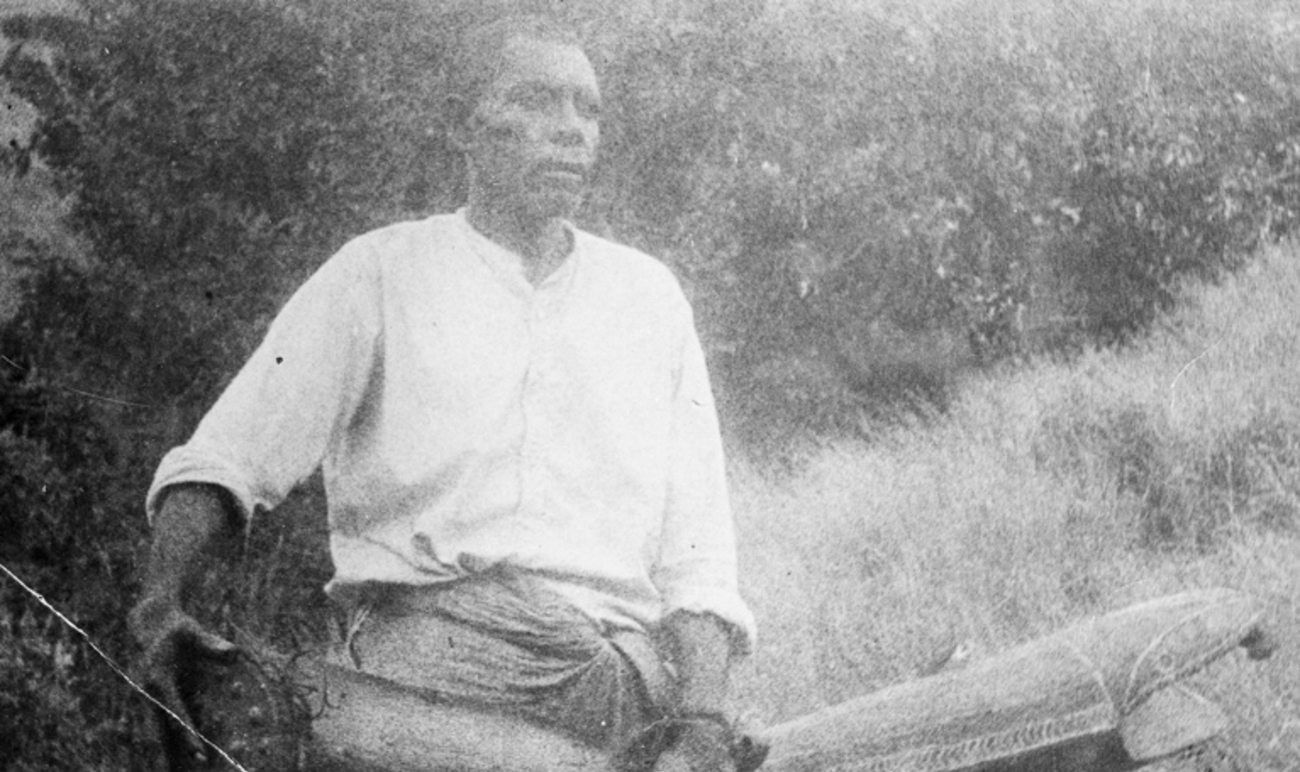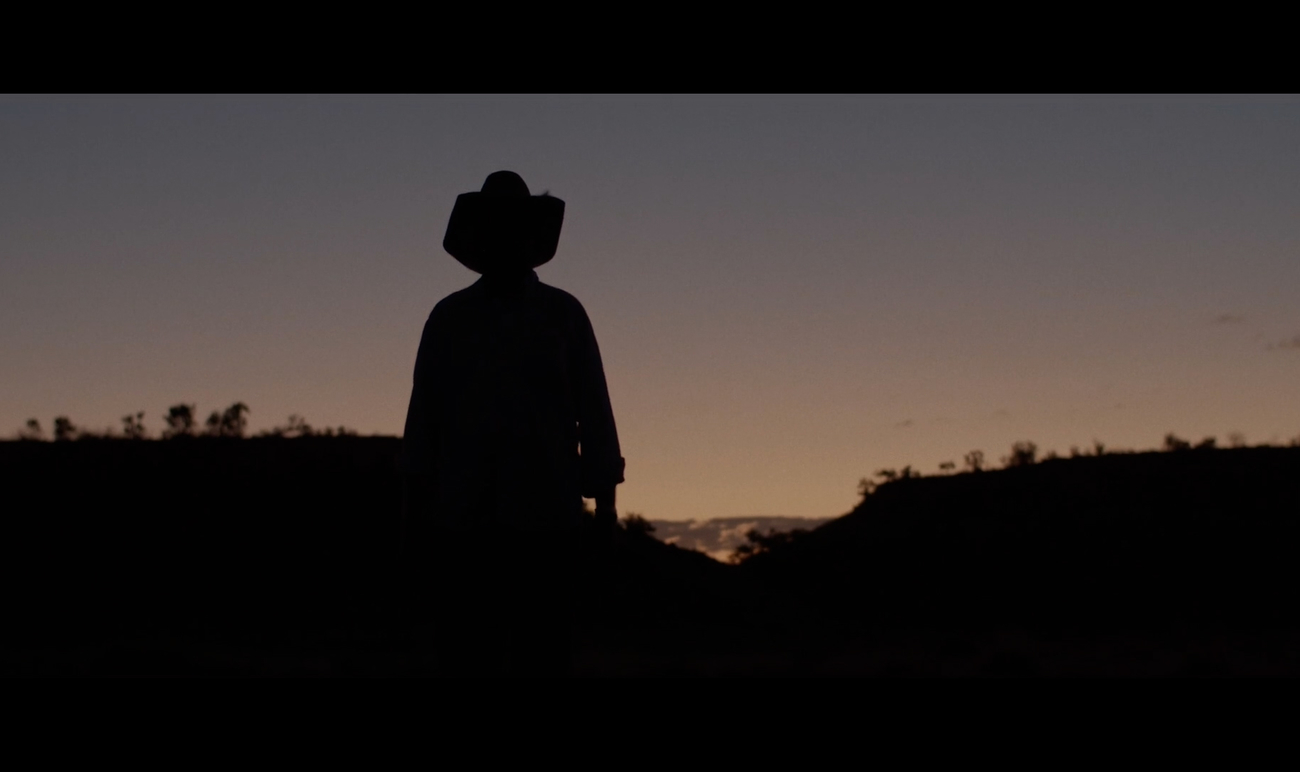The Gary Lee collection: ephemera 1991-2012 contains a number of unique items relating to the play ‘Keep Him My Heart: A Larrakia – Filipino Love Story’. These include draft scripts, the original ink set designs, cue sheets and the art work for the promotional poster for the play. The AIATSIS Collection also holds a rare copy of a cassette sound recording of the music from the play composed by Christian (Bong) Ramilo and performed by the ‘Darwin Rondalla’.
The play ‘Keep Him My Heart’ had its origins in a chance encounter in the lift of the Australia Council for the Arts offices in Sydney in 1991 when Gary Lee met Bong Ramilo. Over coffee a few days later Bong suggested that Gary write a play about his family. The script took three years to complete using a collaborative style that involved input from the Cubillo family steering committee and Bong Ramilo who composed the music. The play has been described as “arguably the first major performance project in Australia to explore Aboriginal-Asian links” (Stephenson, pg. 97).
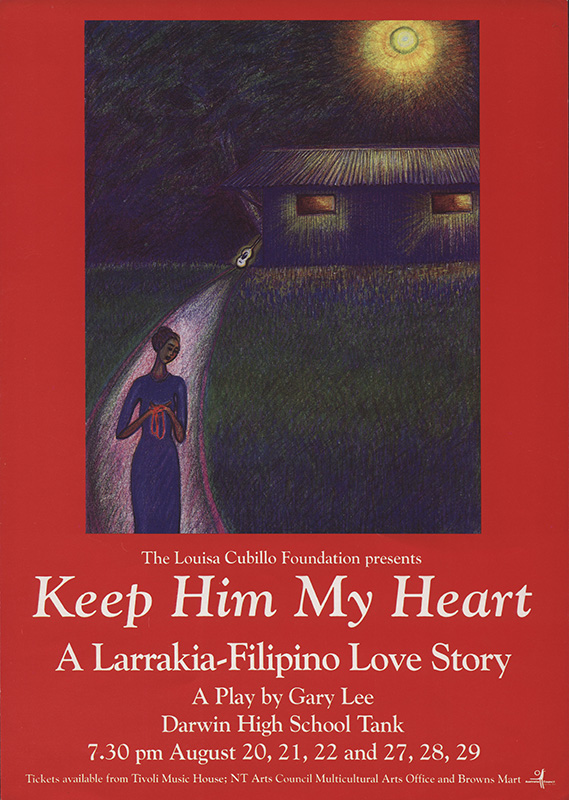
Poster, Keep him my heart: a Larrakia-Filipino love story, a play by Gary Lee, Darwin High School Tank, August 1993.Designer: Gary Lee, MS 5025, Series 3, Item 4 (Photo 1).
Poster, Keep him my heart: a Larrakia-Filipino love story, a play by Gary Lee, Darwin High School Tank, August 1993.Designer: Gary Lee, MS 5025, Series 3, Item 4 (Photo 1).
The first performance of the play took place at the Darwin High School Tank (20-29 August 1993) and included music, oral history, slide projections, dance and monologues. The cast was comprised almost entirely of Aboriginal and Filipino community members. Lee says that his object was not simply to represent: “theatrically a largely forgotten history, it was to re-enact the principles of community making.” (Stephenson, pg. 100). The whole process, from scriptwriting to final production, promoted community participation and enabled the keepers of family stories to control their content and representation (Stephenson, pg. 98).
‘Keep Him My Heart’ tells of the love story between a Filipino - Spanish sailmaker Antonio Cubillo and Larrakia woman Magdalena (Lily) McKeddie (Gary Lee’s maternal great grandparents) and spans 100 years of their family history. Antonio Cubillo arrived in Australia from the Philippines in 1895 and married Lily in 1910. Antonio and Lily had 10 children, one of whom was the author’s mother (Cristina) Mary Cubillo.
The play uses personal history to highlight the wider racial, social and political environment impacting on people of mixed Aboriginal, Asian and Anglo-Australian identities in Darwin from the 1850s to the 1970s. Despite attempts by authorities to keep Aboriginal, Asian and European people separated through protection laws and the ‘White Australia Policy’, the city of Darwin developed a style that reflected much more than white European culture. The play acknowledges and celebrates these multi-faceted/multicultural identities and the alliances that still exist between all these different groups of people today.
In keeping with its multicultural setting, the script is written in Aboriginal English, Standard Australian English and Tagalog (the national language of the Philippines).
The title of the play: ‘Keep Him My Heart’ is an Aboriginal English phrase that “describes enduring love, a love that is kept alive from afar, particularly in the context of two lovers who are separated” (Australian Broadcasting Commission, pg 92). It also refers to Larrakia people’s “efforts to keep their beloved country in their hearts, regardless of the vicissitudes of land rights legislation” (Stephenson, pg. 97).
The music, specially composed for the play by Bong Ramilo, is based on the Filipino Rondalla (string band) musical form which was introduced to Darwin by Antonio Cubillo with the creation of the ‘Cubillo Brothers Guitar Orchestra’ in 1915. Antonio’s four sons took over the band in 1926 and renamed it the ‘Cubillo String Band’. The ‘Cubillo String Band’ continued until the death of one of the brothers (John Cubillo aka Juan Roque Cubillo) during the Japanese bombing of Darwin. The ‘Darwin Rondalla’ group which was formed to provide the soundtrack for the play continues to perform in Darwin and nationally.
The ‘Keep Him My Heart’ theme song from the play can heard at the 24.40 minute point.
Antonio Cubillo’s many trips to the Philippines and the scrutiny he was subject to as an Asian man are dealt with in the play. He was required to obtain a ‘certificate of exemption’ (CEDT) every time he travelled outside Australia. Holding a CEDT was necessary to allow him to return to Australia without being subjected to the dictation test on arrival (Bagnall, pg 2). The dictation test or education test required non-European people to pass a written test in a language other than their mother tongue.
Tragically Antonio was in the Phillipines when WWII broke out and died only a few weeks before he was ready to return to his family in Darwin.
The play ends with the complex problems thrown at the family as claimants in the Kenbi (Cox Peninsula) Land Claim. The Kenbi Land Claim became Australia’s longest running land claim, originally lodged in the 1970s and lasting for 37 years. Ultimate success came for the Cubillo Family in 2016 with the handback of the Cox Peninsula to the family and descendants.
The importance of the material held in the AIATSIS Collections relating to the play is that: “Keep Him My Heart is more than a playing out of relationships across cultures and nations. It is a performance that complicates the very notion of identity itself” (Stephenson, pg 99).
More about this item
Related Items
Cubillo Carter, Inez 2000, Keeper of Stories, Cubillo-Carter Enterprises, Alice Springs
Darwin Rondalla 1994, The music from Keep him my heart: a Larrakia-Filipino love story, Darwin.
Cunneen, C. and Grix, J. 2004 The Limitations of Litigation in Stolen Generations Cases, AIATSIS Research Discussion Paper, Institute of Criminology, University of Sydney Law School, 2004: 7 – 9, 13 – 23
Lee, Gary 1994, Original artwork used for the promotion of the play 'Keep him my heart', Darwin
Resources
Australian Broadcasting Corporation 2001, Lily’s Children, Australian Print Group, Victoria.
Bagnall, K 2018. A legacy of White Australia: Records about Chinese Australians in the National Archives
Facebook 2018 Darwin Rondalla
Find and Connect 2018, Kahlin Compound (1913-1939)
Ganter, R 2006, Mixed Relations, UWA Press, Perth
National Archives of Australia 2018, Certificate of Exemption from Dictation Test - Antonio Cubillo, NAA: E752, 1928/2A
National Archives of Australia 2018, Antonio Cubillo, Naturalization Certificate, NAA: A1, 1920/5541
National Library of Australia 2018, Darwin Rondalla Performance, Canberra.
Odegaard Robb, D 2003 Two Laws - One Land Reflections of a Larrakia Woman, Newcastle Law Review
Solidarity Philippines Australia Network 2007, Bohol Dreaming Cubillo Family reunion: May 12, 2007, KASAMA Vol. 21, no.3, July-September 2007
Stephenson, P 2007, The Outsiders Within: Telling Australia’s Indigenous-Asian Story, UNSW Press, Sydney
